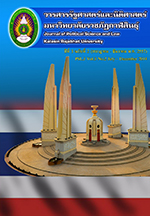ปรัชญาการวิจัย: ปริมาณ คุณภาพ
DOI:
https://doi.org/10.14456/gjl.2014.10คำสำคัญ:
ปรัชญาการวิจัย, วิจัยเชิงคุณภาพ, วิจัยเชิงปริมาณ, Research Philosophy, Qualitative Research, Quantitative Researchบทคัดย่อ
สรรพสิ่งในเอกภพล้วนไม่มีอะไรหยุดนิ่งอยู่กับที่ ธรรมชาติทุกสิ่งย่อมเปลี่ยนแปลงและมีกลไกในตัวของมันเองอยู่ตลอดเวลา สรรพสิ่งมิได้เกิดขึ้นโดยปราศจากเหตุแห่งการเกิด มีทฤษฎีหลายตัวที่สนับสนุนว่าสรรพสิ่งเกิดขึ้นได้ย่อมมีเหตุและผล เช่น ทฤษฎีระบบ หลักธรรมปฏิจสมุปปบาท หลักอริยสัจ 4 เป็นต้น เมื่อมนุษย์ค้นพบกลไกของสิ่งใดสิ่งหนึ่งอย่างถ่องแท้ มักจะสถาปนาว่าเป็นศาสตร์ซึ่งแบ่งเป็นสอง คือ ศาสตร์บริสุทธิ์ และศาสตร์ประยุกต์ เหนือสิ่งอื่นใดคือความจำเป็นอย่างยิ่งที่ต้องเข้าถึงหรือเข้าใจอย่างลึกซึ้งในสภาวะของสรรพสิ่งเหล่านั้นเพื่อให้ได้คำตอบว่าอะไรคือความเป็นจริงอันเป็นที่สุด หากสามารถการเข้าถึงกลไกของสิ่งนั้นอย่างถ่องแท้แล้วจะสามารถควบคุมและใช้ประโยชน์สิ่งนั้นได้ง่ายดาย วิธีการเข้าถึงสรรพศาสตร์ทั้งปวงเรียกว่าวิธีการแสวงหาความรู้ (ญาณวิทยา) หรือเรียกอีกอย่างว่าทฤษฎีความรู้ที่อธิบายเกี่ยวกับที่มาของความรู้ แหล่งเกิดของความรู้ธรรมชาติของความรู้ และเหตุแห่งความรู้ที่แท้จริง ความรู้ที่แท้จริงที่ได้เนื่องจากการตั้งคำถามเชิงระเบียบวิธีวิทยาบนฐานคิดปรัชญาพื้นฐานการวิจัยและทฤษฎีที่อธิบายความรู้ที่ได้ว่าเป็นจริง คำถามเชิงปรัชญาถูกแบ่งเป็น 2 กลุ่ม ได้แก่ (1) กลุ่มเหตุผลนิยม เชื่อว่า เหตุผลเป็นหนทางเดียวที่นำไปสู่ความรู้และความรู้เป็นสิ่งที่ติดตัวมนุษย์มาแต่เกิดเป็นความรู้ก่อนประสบการณ์จึงไม่เชื่อว่าประสบการณ์จะให้ความรู้ที่ถูกต้องแน่นอนและ (2) กลุ่มประจักษ์นิยม หรือ ลัทธิประสบการณ์นิยม เชื่อว่ามนุษย์มีความรู้ในความจริงได้ด้วยการอาศัยประสาทสัมผัสเท่านั้น ความรู้จึงเป็นสิ่งแปลกใหม่และเป็นความรู้หลังประสบการณ์ความจริงไม่อยู่ก่อนเป็นนิจนิรันดร สิ่งที่ทำให้มนุษย์มีประสบการณ์คือ ประสาทสัมผัสทั้ง 5 คือ ตา หู จมูก ลิ้น ผิวกาย ซึ่งเป็นเครื่องมือในการค้นหาความจริง ไม่ใช่จิตแต่อย่างใด ความรู้ที่อธิบายความจริงจะใช้วิธีศึกษาแบบวัตถุวิสัย หรือ อัตวิสัยที่ใช้ในการแสวงหาความรู้ด้วยวิธีการวิจัยเพื่อสร้างองค์ความรู้นั่นเอง ปรัชญากลุ่มประจักษ์นิยม แบ่งเป็น 2 กลุ่มย่อย ได้แก่ (1) กลุ่มปฏิฐานนิยมกลุ่มนี้มีความเชื่อเน้นการศึกษาปรากฏการณ์ที่เป็นวัตถุสสารที่สามารถสัมผัส จับต้องได้ แจงนับ วัดค่าได้อย่างเป็นวัตถุวิสัยหรือมีความเป็นปรนัย และเชื่อว่าปรากฏการณ์ต่างๆ ในธรรมชาติเกิดขึ้นอย่างสม่ำเสมอไม่แปรเปลี่ยนง่ายๆ ความเชื่อกลุ่มนี้ทำให้เกิดระเบียบวิธีวิจัยเชิงปริมาณ ทำให้การค้นพบความจริงในลักษณะเป็นกฎ ทฤษฎีต่างๆ และ (2) กลุ่มปรากฏการณ์นิยมกลุ่มนี้มีความเชื่อว่าปรากฏการณ์ทางสังคมมีความเคลื่อนไหวเปลี่ยนแปลงหรือมีความเป็นพลวัตสูง ดังนั้นการเข้าใจปรากฏการณ์ไม่สามารถทำได้โดยการแจงนับ วัดค่าเป็นตัวเลข หากต้องเข้าใจถึงความหมายและระบบคุณค่า วัฒนธรรมของกลุ่มคนดังกล่าวก่อน ความเชื่อนี้ทำให้เกิดระเบียบวิธีวิจัยเชิงคุณภาพEverything in the Universe is nothing statics, it is usually changing and has a mechanism in its own all time. It does not happen without a cause of, so there is much theory supported such as system theory, the Paticcasamuppāda (The Law of Dependent Origination) The 4 Noble Truths etc... When the man discovered the mechanisms of any one thing perfectly then they will establish it as a sciences which is divided for two the Pure Sciences and the Apply Science. Above all else, the necessary for reach or understanding the condition of things to get answer what is the possible ultimate reality. If we can reach the mechanism of every science perfectly, we will control and exploit it easily. The method to reach all sciences called the knowledge seeking or “Epistemology” also known as “Theory of Knowledge” that explain the source of knowledge, the beginning of knowledge, the nature of knowledge and the cause of actual knowledge. The man has knowledge because of thinking unlike other animals. The knowledge occurred because of the regulation methodology philosophy questions based on fundamental research and theories that described knowledge truly which divided for two; (1) Rationalism believe that the reason is the way leads to knowledge, the knowledge is a body man since birth that is previous experience, it’s unbelief that experience is accurate knowledge, (2) Empiricism or the empiricism doctrine believe that man has a knowledge in the reality relying on sense only, knowledge is the new strange and occurs after the experience (A Posteriori), the truth does not exist forever, what makes human has an experience is the 5 senses are; eye, ear, nose, tongue and body which the instrument for seeking the truth, it is not mental. The knowledge explains the truth by the objective education method or subjectivism as a research methodology for building knowledge itself. The empiricism is divided for two; (1) the Positivism believe and study focused on the phenomenon that is the subject matter which can be touched, tangible, countable, measured on a physical or a objectivity. And believe that the natural phenomenon regularly occur invariant simply. These beliefs lead to be the Quantitative Research Methodology that made the discovery of truth in a rule or theory. And (2) the Phenomenologism believe that the social phenomenon is highly movement or dynamic. Therefore, to understand phenomenon is does not make by counting or measure as a number, but to understand the meaning/values/culture of them mentioned. These beliefs lead to be the Qualitative Research Methodology.
Downloads
ดาวน์โหลด
เผยแพร่แล้ว
รูปแบบการอ้างอิง
ฉบับ
ประเภทบทความ
สัญญาอนุญาต
ลิขสิทธิ์ (c) 2017 วารสารการบริหารปกครอง (Governance Journal)

อนุญาตภายใต้เงื่อนไข Creative Commons Attribution-NonCommercial-NoDerivatives 4.0 International License.








